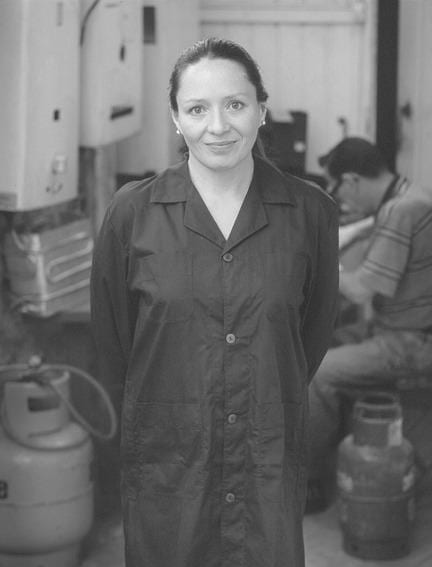Gender and Chile’s Split Culture
Continuing Contradictions in Women’s Lives

A woman plumber. Photo by Alejandro Barruel.
Seven out of every ten Chileans (69%) believe that “Having a job is fine, but what most women really want is a house and children,” according to a July 2003 study by the Santiago-based Centro de Estudios Públicos. That same study reveals that 52% of women (versus 38% of men) strongly disagree with the statement that “Married people are, in general, happier than those who are not married.” (El Mercurio, July 19, 2003) This apparent disconnect reflects the tensions and contradictions that frame the lives of many women in Chile today.
In Chile, as indeed throughout the rest of the world, normative ideas about gender strongly influence women’s lives, expectations, and possibilities. Chileans typically conflate womanhood with motherhood. They associate women with the home, family, and children. Yet, for many women the gendered expectations they receive, and frequently internalize, conflict with the drive to modernity that dominates the national discourse and shapes public values and goals. These expectations also clash with many women’s quotidian reality and desires. In this article, I seek to explore different expressions of this conflict among Chilean women today and offer some explanations as to why it has emerged.
Chile today is a product of the wrenching political, social, cultural, and economic projects of the last forty years. The Chilean experience has ranged from the leftist government of Salvador Allende in the early 1970s, to the military dictatorship of General Pinochet in the 70s and 80s, to the post-dictatorial Concertación government of today. Perhaps ironically, the Pinochet dictatorship had the most profound impact on gender relations; its legacy influences many of the tensions that define Chilean women’s lives today.
The Pinochet dictatorship, like many preceding governments, pledged to modernize Chile. For the military dictatorship, modernization meant neoliberalism and the privatization of the Chilean economy. These policies (which subsequent governments have basically followed) signaled the termination of state subsidies to industry; Chile’s intensified insertion into the world economy; and substantial changes in production, such as the increased growing of fruit and wine for export and the introduction of computers. These changes led to a rapid decline in men’s traditional sources of employment, along with the trade union movement that had defended them. They opened up new areas of work, many of which women now occupy. Thus, while the military regime’s patriarchal discourse defined women as dependent wives and mothers, its economic policies either forced or allowed them to take on new roles as wage laborers, in some cases as the sole financial supporter of their families.
Two other factors explain why the Pinochet period has had such a deep impact on Chilean women today. First, a feminist movement emerged in Chile in the 1980s in opposition to the highly repressive practices of the government and in support of the emancipation of women. With its slogan, “Democracy in the streets and in the home,” this movement broadened the definition of politics to include personal and domestic relations and challenged patriarchal power in society and the family.
Although this dynamic movement no longer exists, it placed feminist demands for equality on the political agenda. Today, many of its leaders occupy important positions in government, influential think tanks, and universities. The Concertación government created SERNAM, (Servicio Nacional de la Mujer), whose director holds ministerial rank. Under SERNAM’s direction, the Chilean government has incorporated legal equality for women and men into the Constitution. It also fostered the passage of a law that eliminated legal distinctions between children born in or out of wedlock.
Several Chilean universities now teach women’s and gender studies. Yet much of the Chilean right and the Catholic Church fervently oppose the demands of the feminist movement because feminist goals challenge patriarchal relations and entrenched ideas about gender. Further complicating the issue, some sectors of the Concertación fail to support certain goals of the feminist movement, such as divorce and abortion rights, thus undermining feminists’ ability to pass legislation on these issues.
The second legacy of the Pinochet era to the women’s movement is Chile’s insertion into the world market. This opening exposed a formerly insular country to an influx of ideas and images about women and men that directly challenged the conservative discourse of the Pinochet regime and the women’s organizations that supported it. While the Pinochet regime preached the idea that women’s fundamental, essential role in life was to be a mother, U.S. and European media showed women performing a range of different roles, many of which reflected the politics and achievements of the global feminist struggle. Furthermore, the neoliberal focus on the individual and consumerism encouraged women to work in order to have money to buy products for themselves, as opposed to being the self-sacrificing wife or mother who submerges her own needs into those of her family.
These different political, social, economic, and cultural influences play out in a variety of ways in Chile today. Women’s gendered realities shape many of their political preferences and a gender gap exists in Chile, just as it does in the U.S. However, unlike the U.S., Chilean women tend to vote more conservatively than do men. For example, the majority of Chilean women opposed the Allende government and, at least initially, supported the Pinochet dictatorship; in the 2000 presidential elections a majority of women voted for rightist Joaquín Lavín, a member of Opus Dei, the extremely conservative Catholic organization. (Margaret Power, Right-Wing Women in Chile)
Today, 46.7% of women work outside the home, the highest percentage that has ever done so in Chilean history. This percentage is low compared to Sweden (81%), but only slightly lower than other South American countries such as Brazil (50%) and Colombia (48%). (El Mercurio, July 19, 2003) Economic necessity, the development of new jobs, and women’s willingness to work explain the increased number of women workers. Women workers typically receive less than their male counterparts, however. For example, women in industry earn only 71.3% of what men do and women in mining receive only 60%. (ICFTU, December 4, 2003) Neoliberal economic policies encourage the large-scale production of fruit and wine for export to Europe and the United States. Women have obtained the majority of the jobs in the fruit industry, in large part because the companies pay women less than they would men, thus making female employment more lucrative to the fruit companies. A high percentage of women work in the informal sector, which is not unionized and lacks security or benefits. Women’s growing participation in the labor force has not translated into gender equality. However, it may have increased women’s self-esteem, capacity to support themselves and their families, and their unwillingness to accept abusive treatment from their male partners.
The Catholic Church wields enormous power in Chile, especially over the lawmakers. Although 95% of Chileans routinely state they believe in God, only about 34% regularly attend church services; and only 27% of young people do. (Santiago Times, May 4, 2001) Equally significant, Protestant churches (which support the right to divorce) are growing in Chile. For many Chilean women professing belief in God is not synonymous with following the dictates of the Catholic Church on social issues. Although the Catholic Church fervently opposes divorce, since it perceives the granting of divorce as the beginning of the slippery slope that will inevitably lead to support for abortion and “homosexuality,” Chilean public opinion overwhelmingly supports it. And many Chileans are simply voting with their feet: larger numbers of young Chileans are simply not getting married. Recognizing that their marriage may not last, they choose to live together rather than face the cost of an annulment or the impossibility of a divorce. Only 73% of Chileans hope to marry while in Argentina 95%, Venezuela 88%, and Brazil 94% of young people do. (El Mercurio, June 21, 2002) Because so many Chileans do not marry, more than one half of all Chilean babies are born to unmarried parents.
Chilean women do not enjoy reproductive rights. As in the case of divorce, hypocrisy pervades the public debate on abortion. The Catholic Church is firmly opposed to abortion. Yet roughly one in three pregnancies ended in an abortion in 1990. (CEDAW, U.N. Concluding Observations, 1995) Without access to a safe way of ended unwanted pregnancy, many women seek unsafe clandestine abortions. Thus, one in five women who induces an abortion requires subsequent hospitalization. The current Ricardo Lagos government maintains a contradictory position on the issue of reproductive rights. It simultaneously declares its opposition to abortion and “supports both parents freely deciding the desired number of births.” (Adriana Delpiano, U.N. General Assembly on “Women 2000,” June 5, 2000)
It is hard to gauge to what degree attitudes toward women’s sexuality are changing. Few women or men expect women to be virgins when they marry and, according to a 2000 study, Power within the Couple, Sexuality and Reproduction by sociologist Teresa Valdés, 77% of the women in her study had premarital sex. The reasons they did so, however, indicate that sexual relations for women do not necessarily equate with women’s empowerment or choice. About 49% of the women said they engaged in sexual relations for pleasure, while an equal number said they did so in response to pressure from their boyfriend or because they feared they would lose him if they did not. Certainly, more women now assert their right to sexual pleasure, but as is true in many parts of the world, that does not mean they are getting it. According to a 2000 study conducted by Fundación Futuro, more than 50% of Chilean women are not sexually satisfied (neither are roughly 50% of Chilean men). The recent bestseller, Women, Their Secret Sexuality, by Chilean psychologist Maria Eugenia Weinstein and award-winning author Patricia Politzer, argues that discussions about sex between couples are still taboo in Chile. Many women fake orgasms, which makes them feel both guilty and deficient, since they assume it’s their fault they don’t have them. Lesbian realities and sexuality remain fairly invisible, although groups like the Colectiva Lesbica Feminista Ayuquelen, whose goal is to strengthen the organization of Lesbians, do exist.
Chileans’ response to the “Glass House” reveals much about current Chilean attitudes towards gender and sexuality. In January 2000 (the Chilean summer), the actress Daniella Tobar took up residence in a glass house, specifically constructed in downtown Santiago as a living art exhibit on the issue of privacy and Santiaguinos’ attitude toward it. Instead, the site became an unbridled display of male sexual repression, aggression, and lust. Tobar conducted all of her daily activities, including taking a shower, in full view of the increasingly large male crowd that gathered outside the exhibit to watch her. At times, the male crowd yelled at her to take her clothes off and take a shower. On various occasions, the men groped and harassed women who happened to be walking by. Despite the fact that scantily clad women serve men coffee in downtown cafes, and that the kiosks of Chile have an overabundance of newspapers displaying women in varying stages of undress, the Glass House scandalized much of Chilean society, which vocally condemned it. A comment made by Tobar in an interview reveals much, I believe, about why her presence evoked such a response and speaks volumes about gender and sexuality in contemporary Chile. When asked how she felt about what she was doing, she replied, “Every day I am getting more and more calm. I am in control now.”
Modernization, despite the tensions and contradictions associated with it, has made it more possible for Chilean women to exert more control over their lives. Economic realities, gender restraints, and women’s own desires limit the extent to which women can exercise or enjoy this control. At the same time, the history of a vibrant women’s movement, new economic possibilities, and the higher profile of women in government, the media, and intellectual centers offer women images and realities that are constantly expanding the definition of Chilean womanhood, opening new interpretations and possibilities for women to emerge from the glass houses they inhabit.
Spring 2004, Volume III, Number 3
Margaret Power is an assistant professor of history at the Illinois Institute of Technology. She is the author of Right-Wing Women in Chile and co-editor, with Paola Bacchetta, of Right-Wing Women around the World. Her current research explores the connections between modernity, gender, and technology in Chile.
Related Articles
Poverty or Potential?
Teresa stops me three blocks from Nueva Imperial’s main plaza on a quiet Wednesday morning, eager to chat. She is wearing a light blue sweater and a matching blue headband glowing slightly against her dark black hair.
Editor’s Letter: Chile
I was hesitant to do an issue on Chile when I had other topics broader and richer in content. Although in a way Chile seems like an obvious choice because of the DRCLAS Regional office there, I felt there were other priorities in terms of substance.
Three Students, Three Experiences
I was extremely impressed with how successful the Chilean health system has been in improving the health of its citizens despite its limited resources. Its success, however, in many…




